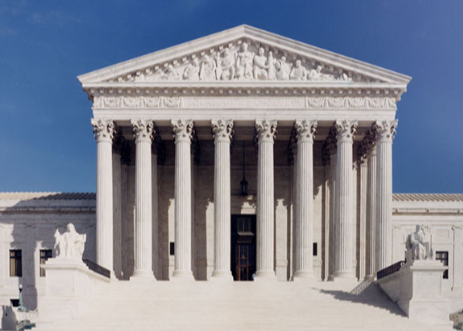US Supreme Court Delivers HUGE Ruling -- HERE WE GO!

A former New Mexico state politician, who was disqualified from public office due to his involvement in the events at the U.S. Capitol on January 6, 2021, has lost his appeal before the U.S. Supreme Court.
Couy Griffin, a former Otero County commissioner known for leading equestrian caravans in support of ex-President Donald Trump, was specifically barred from holding office under the 14th Amendment’s “insurrection” clause, as reported by the Associated Press.
Griffin became the first person in over a century to be removed from office under this clause when he faced trial in a state district court in 2022. The 14th Amendment's clause was originally designed after the Civil War to disqualify former Confederates from government service.
The AP highlighted that the Supreme Court's recent decision reaffirmed that different standards apply to state and local candidates, despite its earlier ruling that states cannot prevent Trump or other federal candidates from being on the ballot.
“We conclude that states may disqualify persons holding or attempting to hold state office,” the justices stated in an unsigned opinion.
The AP also noted: “Griffin, a Republican, was federally convicted for entering a restricted area on Capitol grounds on Jan. 6, receiving a 14-day prison term. He served time after his arrest in Washington during a protest against Biden’s 2021 inauguration, leading to a reduced sentence. Griffin's conviction is currently under appeal. He argues that he entered the Capitol grounds unaware of its restricted status and tried to lead a prayer with a bullhorn, without resorting to violence.”
The Colorado Supreme Court's decision to exclude Trump from the 2024 presidential race was overturned by the top court’s ruling. Furthermore, this decision halted efforts in several states to remove Trump from office based on the “insurrection” clause, despite Trump never being formally charged or convicted of it.
In other news this week, hundreds of federal inmates seeking reduced sentences were impacted by the Supreme Court's ruling against a convicted drug dealer.
The court, in a rare ideological split of 6-3, decided that Mark Pulsifer, who admitted to distributing methamphetamines in 2020, did not qualify under the First Step Act, a significant sentencing reform law, as reported by NBC News.
The issue at hand was whether Pulsifer should be eligible for a “safety valve” provision or face a mandatory 15-year sentence. The clause provides leniency for low-level, nonviolent drug offenders under certain conditions.
In a decision authored by liberal Justice Elena Kagan, the court found that Pulsifer did not meet the necessary criteria. Five of the six conservative justices sided with her.
The ruling addressed various criteria for granting sentences below mandatory minimums. The court rejected Pulsifer’s argument that meeting some, but not all, criteria should be sufficient for relief, stating that full compliance was necessary. The court's interpretation of the term “and” played a role in this determination.
Kagan noted that Congress “did not extend safety-valve relief to all defendants, but only to some.” Conservative Justice Neil Gorsuch, along with liberal Justices Sonia Sotomayor and Ketanji Brown Jackson, dissented.
Gorsuch argued that the court's interpretation significantly undermined the purpose of the First Step Act.
“Adopting the government’s preferred interpretation guarantees that thousands more people in the federal justice system will be denied a chance — just a chance — at an individualized sentence. For them, the First Step Act offers no hope.”